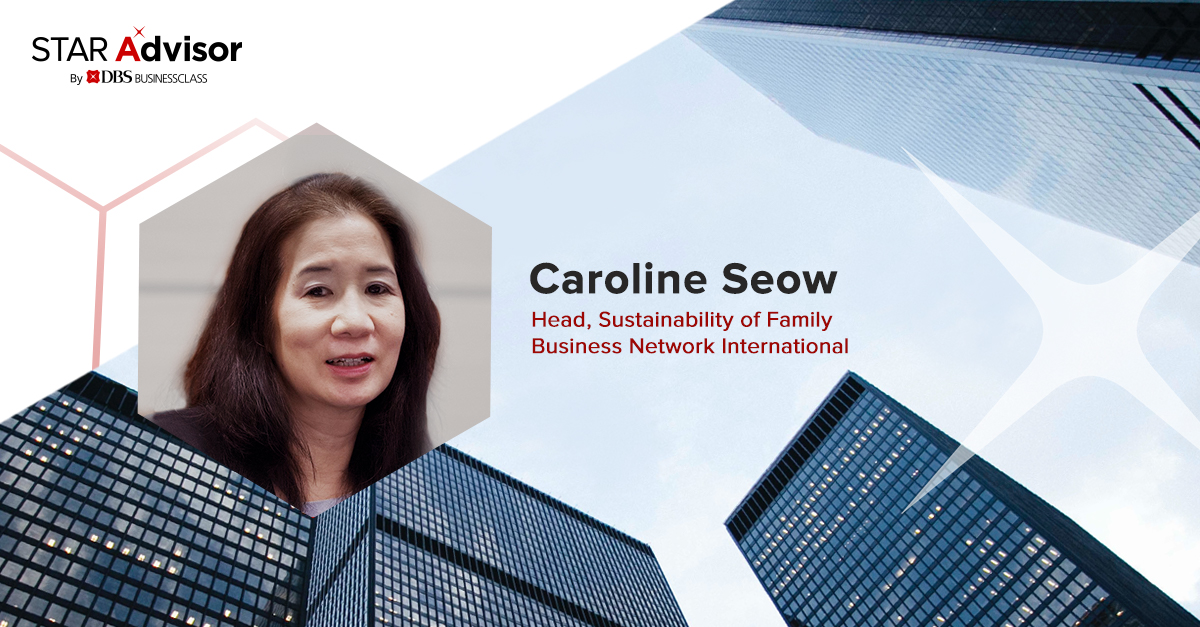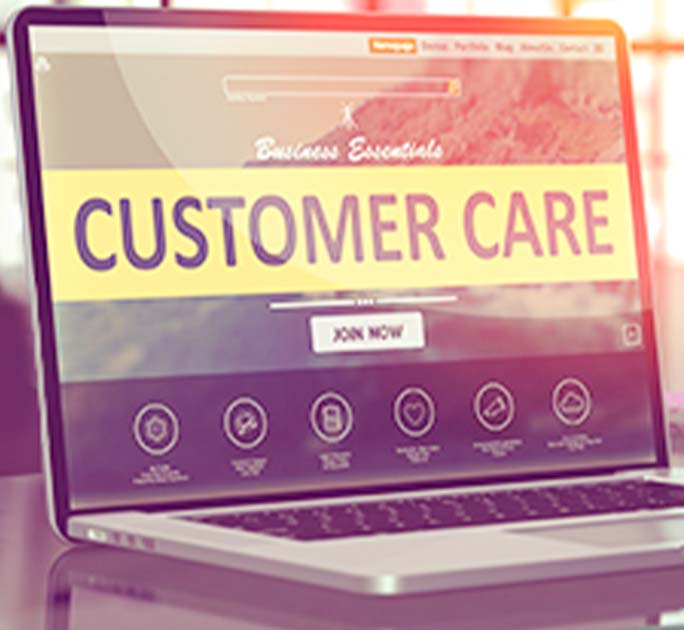Business with a Purpose - 5-Star Advice from Caroline Seow
Star Advisor Caroline Seow, Head of Sustainability, Family Business Network (FBN) International, explains the importance of building a business with a purpose.

Recognising the potential of purpose-driven business to lead inclusive capitalism, Caroline took on the challenge of leading sustainability at Family Business Network International (FBN). In this role, Caroline co-created and leads Polaris – a global movement of “Family Businesses as a Force for Long-Term Good”.
A passionate advocate of purpose and shared value, she develops frameworks to help businesses measure, benchmark and improve their impacts and platforms to enable learning, innovation and co-creation.
She shares her thoughts on why business as usual is no longer an option for today’s entrepreneur and the need to shift mindsets and practices from a ‘shareholder primacy’ to a ‘stakeholder capitalism’ model of business.
Why do you think more entrepreneurs today are keen to start businesses with a social mission?
21st century leaders know that business as usual is not an option. Much of economic activity comes at a cost to society that is not absorbed – let alone understood - by business. These costs or externalities can be seen all over the world: smog in cities, desertification of land, eutrophication of rivers, marginalisation of people through escalating income inequality.
This has resulted in mainstream companies facing significant shifts in social expectations. The public in general and customers are putting pressure on businesses to shoulder their share of responsibilities. In response, we see the emergence of new modus operandi that are increasingly cognisant of environmental, social and governance (ESG) challenges. These measures help enterprises protect their corporate reputations, mitigate business risk and increase stakeholder engagement.
The above strategies are focussed on ‘minimising harmful impacts.’ Yet at the same time, we are seeing the emergence of more purpose driven businesses e.g. B Corps who are not focussed on just ‘minimising harm’ but intent on ‘maximising good’; leveraging their operational know-how and aligning their value chains for positive social and environmental impact. Recognising the potential of business to be a force for societal good, they have moved away from an emphasis on image to an emphasis on substance. They understand that ‘flourishing’ – creating benefit for human, social and environmental endeavours is the way for enterprises to thrive.
What are the commercial benefits of incorporating social purpose into a business?
Numerous studies have demonstrated that businesses which incorporate purpose have a competitive advantage. Sustainable companies deliver significant positive financial performance, and investors are beginning to value them more highly.
Having a purpose allows companies to build a stronger brand, hire top talent, build trust, attract investors and generate positive press. It also helps to cut costs by streamlining operations, reduce waste and improve efficiencies, as well as mitigate risks by improving transparency and ensuring compliance in their supply chain.
All these translate to improved performance, a more resilient organisation, and a more profitable enterprise. And provide the impetus for companies to embed sustainability into the core of their culture, strategy and operations.
Oxford Arabesque (2015) ireviewed the academic literature on sustainability and corporate performance and found that:
• 90% of 200 studies analysed conclude that good ESG standards lower the cost of capital;
• 88% show that good ESG practices result in better operational performance; and
• 80% show that stock price performance is positively correlated with good sustainability practices.
In terms of new markets, far-sighted and purpose-driven entrepreneurs are recognising the business opportunities presented by the UN Sustainable Development Goal (SDGs) and have started to identify, develop and deliver pioneering solutions that profit both business and society.
Designed in consultation with businesses, civil society and governments, the 17 SDGs encompass infrastructural, economic, social and environmental dimensions and present a historic opportunity for businesses to engage as a strong and positive influence on society.
The SDGs offer a compelling growth strategy and a study by the Business & Sustainable Development Commission revealed that just four key economic systems – Food & agriculture, cities, energy & materials, health and well-being open up an economic prize of at least US$12 trillion for businessesii. An increasing number of unicorns in circular manufacturing, healthcare, renewables, food waste etc. are finding success in market opportunities aligned with the SDGs.
Specifically, how does being a socially responsible business help attract talent?
Companies that invest in sustainability initiatives tend to create a sought-after culture. They treat employees as critical stakeholders, just as important as shareholders. Employees are proud to work there and feel part of a broader effort. Studies have found thatiii:
• Morale was 55% better in companies with strong sustainability programs, compared to those with poor ones;
• Employee loyalty was 38% better. Better morale and motivation translated into reduced absenteeism & improved productivity;
• Firms that adopted environmental standards have seen a 16% increase in productivity over firms that did not adopt sustainability practices;
• Firms with greater corporate responsibility performance can reduce average turnover over time by 25-50%. It can also reduce annual quit rates by 3-3.5% and save replacement costs of up to 90%-200% of an employee’s annual salary for each retained position.
This sense of purpose strongly resonates with today’s Millennial generation. Studies indicate that working with purpose-driven organisations is key for next-generation leaders.
How can a business balance the twin objectives of profitability and purpose?
In any business there are strategic and ethical decisions to be made. e.g.
• How do I hire? Do I pay a living wage? What about health and safety considerations?
• How do we screen our suppliers? Do we negatively screen? Are we checking for forced labour in our supply chains? Do we positively screen? Do we want to work with companies that are transparent, and values aligned?
• What energy and environmental policies are in place? How do I limit my GHG emissions or dispose of hazardous waste?
In a world of rising temperatures, escalating income inequality and deepening distrust of ‘shareholder primacy’ business models; consideration of workers, community and environmental impacts are no longer just ‘nice-to-haves’. They are an imperative for businesses.
Far-sighted businesses understand that purpose and profitability are two sides of the same coin. On top of recruiting the best talent and strengthening bonds with customers and communities, clarity of purpose raises the bar as it delivers known benefits to every part of the organisation. The marketing department regards purpose as a source of differentiation and growth. HR cherishes the strong employee engagement and retention culture. Finance embraces the future-proofing of the business. Operations values the increase in productivity and efficiency. And the leadership team leverages purpose to inspire and mobilise everyone in a way that the sole pursuit of profits never will.
As a DBS BusinessClass Star Advisor, Caroline Seow offers her insights and advice exclusively to BusinessClass members through networking sessions. Check out the highlights from the session with Caroline here. If you require specific advice or support from any of our Star Advisors, get in touch with us here.
i“From the Stockholder to Stakeholder” Oxford Arabesque
ii“Sustainable Cusiness Can Unlock at least US$12 Trillion in New Market Value, and Repair Economic System” Business Commission
iii“Is Sustainability Part of your Employer Brand?” Talent Daily
Was this information useful?
Thanks for your feedback
Subscribe to DBS BusinessClass
Stay updated with the latest market trends and industry insights, connect with a network of entrepreneurs, and gain access to exclusive event invitations. Join Asia's fastest growing business community – get your complimentary membership here.





That's great to hear. Anything you'd like to add?
We're sorry to hear that. How can we do better?